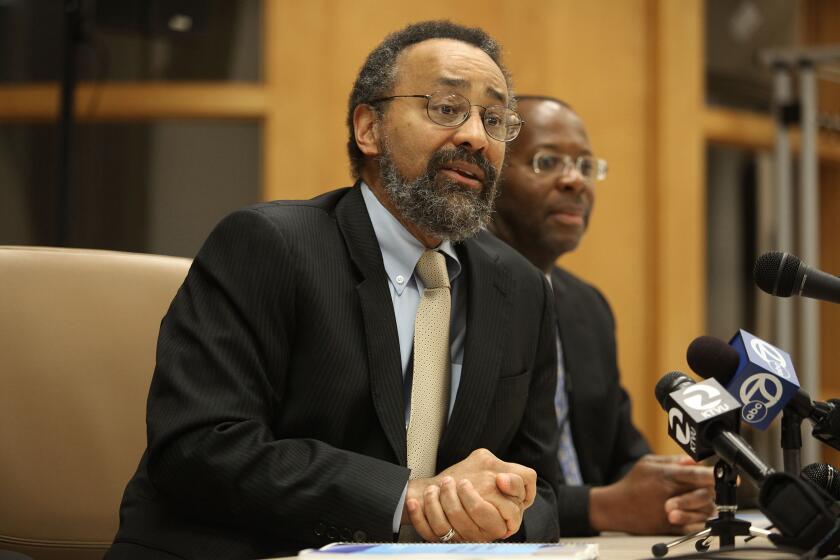Surrogate’s Custody Fight Opens : Courts: Hearing may lead to redefinition of ‘parent.’ Lawyer says woman who bears a child, even if genetically unrelated, is the rightful mother.
A pivotal hearing in the landmark custody battle over a baby boy born to Orange County surrogate mother Anna L. Johnson opened Tuesday, with testimony that any woman who delivers a baby is entitled to consider herself a parent, even if she has no genetic relationship to the child.
Dr. Michelle Harrison, a psychiatrist at the University of Pittsburgh and a consultant to the National Coalition Against Surrogacy, said the genetic makeup of a child is not all that dictates its parentage. Where the birth mother and the genetic mother are not the same woman, as in the Johnson case, it is the birth mother who makes the more important contribution to the baby, Harrison said.
“She is the mother of the baby because she gestated and gave birth to this child,” Harrison said, referring to Johnson.
“What makes her a mother is her emotional and physical work in nurturing the fetus and the way in which her body builds the baby,” Harrison said. “It brings oxygen. It takes away waste. It protects the baby from bacteria and external assault.”
Tuesday’s testimony began what is expected to be a three-day hearing on who should be considered the legal parents of the baby boy Johnson delivered Sept. 19. Johnson, 29, who agreed to bear an infertile couple’s child for $10,000, now contends that she is the child’s mother because she bore him and that she should keep the baby.
Mark and Crispina Calvert, the couple whose embryo Johnson carried, are fighting for custody, claiming they are the baby’s true parents because the child is made from their genetic material.
At the close of the hearing, Orange County Superior Court Judge Richard N. Parslow Jr. will have to decide who the baby’s parents are. If he rules that all three adults have parental rights, the decision could prove critical in future surrogacy cases. It would greatly expand the current legal conception of parentage.
Harrison, who said she has counseled Johnson six or seven times over the telephone, testified that Johnson has expressed deep feelings of attachment to the child, and that it does not matter to Johnson that she is not genetically related to the baby.
Blood tests have shown that the Calverts are the genetic parents.
The Calverts’ lawyer, Christian R. Van Deusen, asked Harrison if her feelings about Johnson’s attachment to the baby were affected by a July 23 letter Johnson wrote to the Calverts in which she threatened to keep the baby if she was not immediately paid the remainder of her $10,000 fee. Harrison said that did not matter.
“Pregnant women faced with the loss of their baby say and do a lot of things to keep them,” Harrison said.
Van Deusen also tried to attack Johnson’s credibility by bringing up her guilty plea to two misdemeanor counts of welfare fraud, but the judge would not allow it.
“I don’t want to try that case in here, Mr. Van Deusen,” Parslow said.
Johnson’s attorney, Diane Marlowe, said in a brief opening statement that she objects to the “wrongful withholding” of the baby from Johnson. The infant is living temporarily with the Calverts. Johnson is permitted to visit twice a week.
“The evidence will show it does not matter how a woman gets pregnant,” Marlowe said. “When she gives birth, she’s the natural mother. She’s the biological mother. She’s the legal mother.”
More to Read
Start your day right
Sign up for Essential California for news, features and recommendations from the L.A. Times and beyond in your inbox six days a week.
You may occasionally receive promotional content from the Los Angeles Times.






